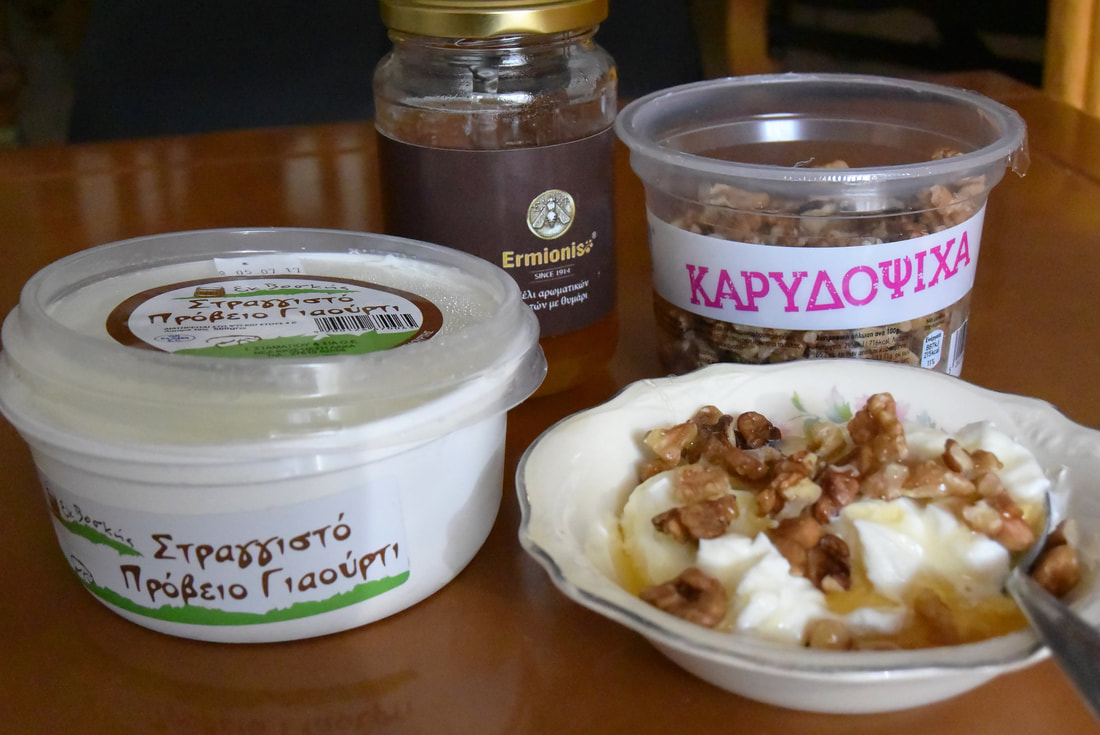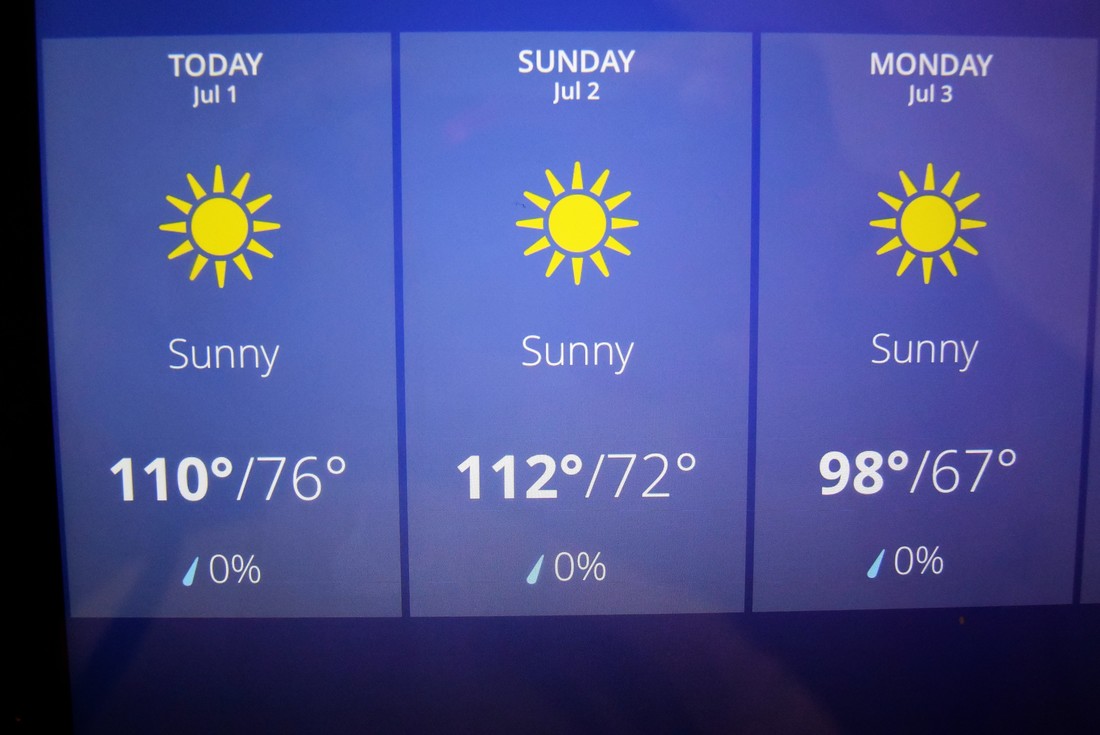|
7/12/2017 0 Comments A Table Amid the FarmsYou might have had yogurt for breakfast. Maybe even “Greek style” yogurt that is popular today. I did as well.
The yogurt in my bowl was from a dairy farm in Nea Kios, a seaside village about four miles from my kitchen here in Nauplion, Greece. Made from sheep’s milk, it was thick and tangy. You need two spoons to get it out of the container: one to scoop and the other to scrape it from the first spoon into the dish. I topped it with dark golden honey and walnuts. The honey was harvested from bee colonies that gathered nectar from the purple-white flowers of summer thyme growing in the mountainside village of Kranidi about twenty miles down the coast from here. I’m sure of the provenance, because I purchased the honey and yogurt directly from the second and third-generation owners of both businesses. They were selling at booths set up at a fair. The enthusiastic Katerina at the yogurt stand insisted that I taste the various styles of yogurt. She also had a glossy brochure showing photos of the dairy farm and the production process. To be sure, the family business had been around a long time without the need for any sales literature. The same was true at the honey stand. Several jars with disposable spoons were offered for tasting. Giorgios, the twenty-something young man in charge, explained that his family had been harvesting honey for several generations. He had an advanced degree from the Athens University of Economics and Business. But not finding a job, he returned to Kranidi and applied his business acumen to marketing his family’s products. If either the yogurt or honey were available in the U.S. they would be featured in an Eater Heatmap and a New York Times food section write-up. But here in Greece farm-to-table products have simply been a way of life for years. Even today produce is purchased primarily through local farmers markets or from small independent markets that specialize in fruits and vegetables. In my town of Nauplion the “laiki”, or farmers’ market, is held twice a week – Wednesday and Saturday mornings. Farmers load up their trucks and bring their oranges, nectarines, cherries, watermelons, leafy greens – whatever the fields are giving forth, and hawk them under portable tents along the designated street in town. The scene is lively with each stall owner cajoling passersby to purchase – the sweetest! freshest! best quality! -- that they have to offer. Yes, you can find a meager produce section at supermarkets. But it is not how Greeks are accustomed to shopping for their kitchens. What has changed in the past twenty years, and was accelerated by the debt crisis and subsequent widespread unemployment, is that the farm-to-table way of life has donned a mantle of modern business. As Giorgios and Katerina show, a new generation is turning long-standing local production into boutique industries. They are leapfrogging food trends in the U.S. In the early 2000s much was made of countries in sub-Saharan Africa going from having no telephone service at all directly to widespread mobile phone use. In much the way they leapfrogged landlines, Greece skipped an era of mainstream food (with some exceptions) and is simply updating the traditional ways of delivering locally made foodstuffs. It is really heartening to see that the Greek spirit and ability to make the most of any circumstance is alive and well in 2017. Kali Orexi!
0 Comments
7/3/2017 2 Comments 112 Degrees in the Shade“Everyone complains about the weather, but no one ever does anything about it.” – Mark Twain The temperature had reached 105, according the thermometer on my apartment balcony, at half past three o’clock on Saturday when the power failed. A split second later a muffled bass boom reached my ears. The air conditioner clicked off and everything fell silent for a moment. A strange alarm began sounding nearby. Like something you’d hear on a submarine in the movies with a high metallic screech. I felt a slight dread and looked outside. Nothing but the bright, harsh sunlight of July in Greece. Not a single car driving by. I figured something would happen soon. Just a temporary power surge. After all it was a weekend afternoon and at this time of day lots of people would be at home sitting down for a family lunch. Nearly everyone would be running their AC for a bit. Surely in some electrical facility an engineer was following procedures to kick in the backup system and we’d all go about our business. I still thought that an hour later as the temperature kept rising. And then two hours later when I started thinking about the perishables in the refrigerator that I’d stocked just that morning. And then four hours later when I was planning out my evening to be somewhere cooler. Heading down the stairwell I ran into a neighbor who said he’d heard that the whole city had gone out and that it was serious. Might be much later before we had power. “Can you believe that? How can the authorities let this happen? We rely on tourism here, what are all the visitors in hotels going to do? This doesn’t happen in America does it?” I mumbled something about how it does happen occasionally. Although I couldn’t honestly remember the power being out for more than an hour, even during a winter ice storm. I went down to the harbor front where, to my relief, the power was on. At the café the talk was that the electricity had been coming in and out intermittently all afternoon. I heard more commentary on the sad state of affairs of the country’s infrastructure. So, as I nursed my Souroti, a cold sparkling water, I thought of how Greeks beat the heat. This is a Mediterranean country with hot summers. People have been figuring out ways to live in this environment for a long time. Here is my list of top ten ways Greeks stay cool in the summer: Shade Pretty obvious, but the good thing about Greece is that the humidity is usually pretty low. About 15 percent or so during the day. If you are in the shade of the coffee shop or your balcony you are already much better off. This also goes for wearing long sleeves and pants. Seems counter intuitive, but you’ll be cooler without the sun hitting your skin directly. Hydration Lots of cool water. Ice cubes are not common. In the States we throw ice cubes in everything. Here you might get a couple in your iced coffee or served in a bowl with a spoon with your ouzo. But the cool water is actually better for you because your body doesn’t have to work as hard to regulate your temperature to bring ice cold drinks back up to your normal temperature. A submarine Not the military kind, but the traditional Greek summer spoon treat. This is usually made with masticha, a sticky white paste that is dunked into a glass of water. You slowly lick off the spoon the sweet masticha which is made from the sap of trees that grow only on the island of Chios. Another favorite is vyssinada. This is a sweet syrup made with sour cherries and stirred into a cold water. My grandmother made it every year. Freddo espresso Up until a few years ago, the king of summertime iced coffee drinks in Greece was the frappe. It was just Nescafe instant coffee chilled. Now the preference is for a real espresso shot shaken with ice. The caffeine jolt in the ice coffee helps you cool off. Fresh fruit Every meal here ends with a tray of sweet fresh fruit. Greece has an abundance of excellent summer fruits – cherries, peaches, oranges, apricots, nectarines and lots of melons. Later in the summer, grapes and figs abound. Gelato You’ll find plenty of this Italian treat everywhere. It has a lighter texture and more bold flavors than ice cream. Much better for the hot summertime. Siesta No reason to go out and about between 3 and 6 pm. Take a nap instead. Like many southern European countries, Greeks time shift their day to accommodate the weather. Ouzo/Tsipouro/Masticha These local Greek aperitifs are another good way to cool off in the evening. Especially when you add ice to the ouzo and it turns a nice milky white. Take a “voutia” Head to the beach for a swim. Greece has more coastline than any other country in the Mediterranian. You are never far from the ocean. Cold shower If you can’t get to the beach, a cold shower is a good substitute. In fact, there is a body of scientific evidence proving cold showers have a lot of health benefits from increasing immune system function to lowering depression. Seriously, Google it. The point is that Greeks face the heat, as with many things in life, by accepting and adapting. In the U.S. we tend to run from an air conditioned house, to an air conditioned car to an air conditioned office or store. We resist and fight nature. There is much less stress in going with the flow a little bit. I returned to my condo building at about 11:30 p.m. only to find that the power was still out. Everyone was out on their balconies to catch at least some evening breeze even though the temperature had only dropped to the mid-nineties. We all watched as a truck from the electric company rolled down the street. Someone jumped out with a headlamp on his forehead and consulted a map. A group of four or five men with reflective vests stood around talking to neighbors who had come down to the street. But nothing happened. I lay down on my bed and was as still as possible. Sometime around one in the morning the power came back on. I half expected the balconies to erupt in cheers and clapping. But everyone just went about their evening as if this was just another part of life. I slept with the air conditioning on the rest of the night and it was awesome. I’ll save the gelato for breakfast. |
Petro KacurI have a variety of interests and enjoy sharing my reflections on them here. Archives
March 2021
Categories |


 RSS Feed
RSS Feed